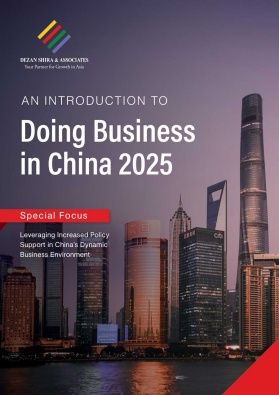China’s Social Credit System Raises Stakes for Dishonest Businesses
China’s new social credit system guidelines tighten enforcement against dishonest behavior. Businesses classified as seriously dishonest will face significant restrictions, including bans on accessing government funds, tax incentives, and securities offerings. Industry-specific blacklists are also expanding, signaling tougher oversight in real estate, internet services, human resources, and energy sectors.
On March 31, 2025, the General Office of the Communist Party of China Central Committee and the General Office of the State Council jointly issued a sweeping policy document designed to accelerate the modernization of China’s social credit system. The newly released Guidelines on Improving the Social Credit System (hereinafter, the “Guidelines”) set out 23 specific measures aimed at promoting high-quality economic and social development through enhanced credit governance.
The document emphasizes the integration of unified rules across all entities—public institutions, private enterprises, social organizations, and individuals—while reinforcing the legal foundations, transparency standards, and applicability of the credit system. Key objectives include strengthening regulatory consistency, optimizing the business environment, and embedding credit mechanisms into all facets of social and economic governance.
With a strong focus on building a fair, competitive, and trustworthy national market, the Guidelines call for improved information sharing, standardized enforcement of disciplinary measures, and robust protections for personal data.
In this latest iteration of the social credit framework, the Chinese government aims not only to support market regulation and administrative efficiency, but also to position credit as a cornerstone for sustainable development and long-term economic resilience.
Overview of China’s new Guidelines to strengthen the social credit system against dishonest behavior
The Guidelines outline seven priority areas aimed at strengthening the foundation, governance, and practical application of China’s social credit system. Each area is designed to enhance transparency, consistency, and the effectiveness of credit-based regulation, while reinforcing the legal underpinnings of the system.
| China’s Social Credit System Raising Stakes for Dishonest Businesses | ||
| Area of Application | Purpose | Detailed Actions |
| Comprehensive coverage of credit subjects | The Guidelines call for the expansion of the social credit framework to cover all relevant subjects—government entities, businesses, social organizations, and individuals. |
|
| Strengthening data infrastructure | The construction of a reliable, secure, and interoperable credit data system is a core priority. |
|
| Legal enforcement and unified penalty mechanisms
|
Ensuring fair and consistent punishment for dishonest behavior. |
|
| Incentives for trustworthy behavior | Entities and individuals with strong credit records are to be rewarded through preferential policies, easier access to public services, and financing incentives. | The government encourages platform enterprises and financial institutions to tailor rewards using big data analysis. |
| Integration into regulatory and administrative systems | The credit system is positioned as a foundational element of governance. | Credit information and reports will be integrated into:
Moreover, a tiered regulatory approach based on credit status will be promoted to ensure proportionate oversight. |
| Marketization and social participation | Cultivating a mature credit service. | The Guidelines seek to cultivate a mature credit services market by:
|
| Institutional and cultural support | Building legal and cultural foundations for the credit system. | Efforts will also focus on building legal and cultural foundations for the credit system through:
|
Together, these measures aim to foster a credit-based governance environment that is legally grounded, technologically advanced, and widely accepted by society.
Rising stake for dishonesty
The Guidelines reaffirm the importance of legally grounded, transparent, and proportionate enforcement mechanisms to penalize dishonest behavior. Emphasis is placed on ensuring that disciplinary actions are both standardized and fair, avoiding arbitrary or overly punitive measures.
Legal basis for disciplinary actions
All disciplinary measures must be clearly rooted in laws, administrative regulations, or relevant departmental rules. The Guidelines stress that no punitive action—such as blacklisting or limiting access to public resources—can be applied without explicit legal or regulatory backing. This is aimed at ensuring procedural legitimacy and preventing misuse of the credit system.
Clear scope and intensity of penalties
The authorities are instructed to refine the classification of dishonest behavior, distinguishing between general and serious infractions. Penalty mechanisms must align with the severity of the violation, avoiding a one-size-fits-all approach. The Guidelines call for the establishment of objective standards for:
- Inclusion in and removal from lists of seriously untrustworthy entities; and
- Restrictions on participation in government procurement, bidding, investment activities, and receipt of subsidies or honors.
Standardized disciplinary protocols across sectors
A unified approach will be adopted to ensure consistency in disciplinary practices across industries and administrative bodies. Measures include:
- The issuance of departmental rules clarifying the procedures for listing, appeal, and correction;
- Promotion of sector-specific dishonest behavior lists, particularly in areas like the real estate market, internet platforms, human resources, and energy trading; and
- Strengthening of credit supervision in high-impact industries, especially those affecting public interest and market order.
These efforts aim to create a transparent, proportionate, and enforceable framework for disciplining untrustworthy conduct—one that is recognized by both the public and market actors as legitimate and fair.
Consequences for seriously dishonest entities
Entities classified as “seriously dishonest” will be subject to a suite of punitive measures intended to deter misconduct and protect the integrity of China’s market environment. According to the Guidelines, these entities may face restrictions or outright prohibitions in the following key areas:
- Access to government funds: This includes being barred from applying for or receiving fiscal subsidies, special funds, or policy support.
- Eligibility for tax incentives: Discredited entities may lose preferential tax treatment or face increased scrutiny during audits.
- Participation in capital markets: Entities on the dishonesty list may be restricted or banned from issuing bonds, stocks, or other financial instruments.
These measures must be legally enforceable and proportionate, and their application must adhere to the principle of “punishment fitting the offense.” Regulatory authorities are required to establish due process mechanisms, including the right to appeal and clear notification requirements, to safeguard against arbitrary sanctions.
Expansion of dishonesty lists
As part of the system’s refinement, the Guidelines call for an expansion of dishonesty blacklists to include additional high-risk and strategically important sectors. Specifically, new lists will be created to monitor and regulate dishonest practices in the following industries:
- Real estate: To curb speculative behavior, enhance transparency, and protect homebuyers.
- Internet services: Including livestreamers, content creators, and digital platform operators, who are now under stricter credit scrutiny amid broader efforts to clean up online ecosystems.
- Human resources markets: With a focus on ensuring ethical recruitment practices and compliance with labor laws.
- Medium- and long-term energy contracts: To support energy security and contractual reliability in key national projects.
By targeting these sectors, the authorities aim to preempt systemic risks and reinforce public trust in essential service markets. The inclusion criteria for these lists, as well as the resulting consequences, are expected to follow standardized enforcement protocols as outlined in earlier sections of the Guidelines.
Recommendations for entities classified as “seriously dishonest”
Businesses operating in high-risk sectors such as real estate, digital platforms, human resources, and energy should be especially vigilant. These industries are being singled out for enhanced oversight, and entities in these fields face a higher probability of regulatory scrutiny, inclusion on dishonesty lists, and subsequent market or funding restrictions. Companies in these areas should prioritize internal compliance mechanisms and proactive credit risk management to avoid long-term reputational and financial consequences.
Maturation of China’s social credit system: Key innovations and global outlook
The release of the 23 new Guidelines by China’s State Council marks a pivotal moment in the evolution of the country’s social credit system. Building upon a decade of experimentation and regulatory adjustments since the system’s initial blueprint in 2014, these measures reflect a transition from foundational design to full-scale implementation and international positioning.
Systemic refinement
The new document reflects a move toward systemic consolidation. Unlike earlier, often fragmented or experimental phases of implementation, the Guidelines emphasize the unification of standards across government agencies, enterprises, and individuals.
Government departments themselves are now subject to credit evaluations, with records of misconduct—such as irregularities in public resource trading or enterprise-related charges—resulting in administrative consequences, including limitations on access to funding and performance assessments.
Moreover, the Guidelines formalize the establishment of the “seriously discredited entities” list in key sectors such as real estate and internet platforms. Entities listed may face significant consequences, including restrictions or outright bans on issuing stocks or bonds—raising the stakes for compliance and aligning credit records more directly with financial market access.
Strengthening credit governance in the platform economy
One of the notable areas of focus is the inclusion of the platform economy. The Guidelines call for increased regulatory oversight of internet streamers, influencers, and other digital content distributors. This reflects Beijing’s intent to extend governance over a growing informal economy where reputational capital often supersedes traditional financial credit in value.
Global integration and data security commitments
Looking beyond China’s borders, the Guidelines emphasize cross-border cooperation on credit data sharing, particularly with BRICS countries and Belt and Road Initiative participants. Although operational details remain limited, the policy direction suggests an ambition to establish globally competitive credit-rating institutions and promote mutual recognition of credit products. This aligns with China’s broader strategic aim of shaping global standards in digital governance and economic infrastructure.
However, the expansive nature of the system has raised enduring concerns about privacy and data security. In response, the Guidelines include provisions to curb excessive data collection and prohibit the illegal processing or sale of personal information. The introduction of a traceability mechanism for credit data and an accountability framework for violations marks a step toward balancing governance goals with individual rights protections.
Toward a high-trust society?
Taken together, the Guidelines are not merely technical updates but signal an ideological and regulatory shift toward a more structured, enforceable, and internationally engaged credit governance regime. Whether this will successfully yield a “high-trust society” without compromising civil liberties remains an open question—but Beijing is clearly committed to institutionalizing credit as a central pillar of social and economic governance.
Also read
- China’s Social Credit System: What Businesses Need to Know
- China’s Social Credit System: Scope of Information Collection and Punishments for Untrustworthy Entities
About Us
China Briefing is one of five regional Asia Briefing publications, supported by Dezan Shira & Associates. For a complimentary subscription to China Briefing’s content products, please click here.
Dezan Shira & Associates assists foreign investors into China and has done so since 1992 through offices in Beijing, Tianjin, Dalian, Qingdao, Shanghai, Hangzhou, Ningbo, Suzhou, Guangzhou, Haikou, Zhongshan, Shenzhen, and Hong Kong. We also have offices in Vietnam, Indonesia, Singapore, United States, Germany, Italy, India, and Dubai (UAE) and partner firms assisting foreign investors in The Philippines, Malaysia, Thailand, Bangladesh, and Australia. For assistance in China, please contact the firm at china@dezshira.com or visit our website at www.dezshira.com.
- Previous Article Impact of US-China Tariffs on Transfer Pricing – Considerations for MNCs
- Next Article

























